Text
Kevin Law
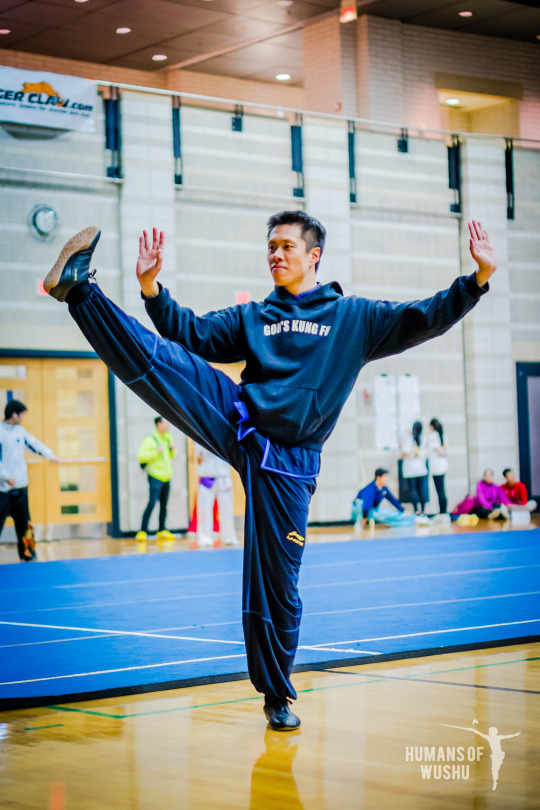
How and when did you start doing wushu?
In 1994 my mom enrolled me in kung fu classes because she thought I was weak. Walking in I was skeptical whether I would like it at all but from the moment I was taught my first stance I was absolutely in love.
How did you get involved with judging wushu competitions? What are your thoughts on going from a practitioner to a judge? Has being a judge influenced your own wushu? If so, how?
My first judging experience was in a University Wushu Games organized by Terp Wushu. At first it worried me, would it mean that my days of competing would be over soon? Being a judge has had a big influence on my own Wushu to see what it is like from the judge's side of the table. If you want to impress someone who's tired, hungry and probably has a headache from watching and focusing on so many forms then you better be good. Judging has taught me to more appreciate basics and fundamentals. In the end it does not matter what form you do, just make it good.
How did you get into sanda? What are your thoughts on the bridge between sanda and wushu taolu? How has sanda influenced your taolu or vice versa?
I've done a good amount of fighting practice in the past but never true Sanda training as I am unfamiliar with the throws and wrestling. I love that the World Wushu Championships includes Sanda and Taolu. I like to think that there is a lot of mutual respect between athletes of the two disciplines and bringing them together in the WWC helps that. My Sifu, Anthony Goh, always emphasized that whatever is done in a form it must clearly show intent, application and power. So every move I do I try to do it with the focus of a fighter hitting a pad or an opponent.
Tell me about a favorite wushu memory?
In 2015 my school put on a big performance on the steps of the Baltimore Museum of Art celebrating the reopening of their Asian art wing. It was a perfect sunny June day, not too hot with a refreshing breeze if you took a moment to enjoy it. The weather meant we had a great crowd. At one point I was finishing the compulsory chen taiji jian form. From the steps my eyes were focused not on the crowd below but on the trees across the street. I slowly stood up at the end of the form, watched the leaves sway in the wind and felt the breeze along with an overwhelming sense of pride of my wushu practice and where it has lead me.
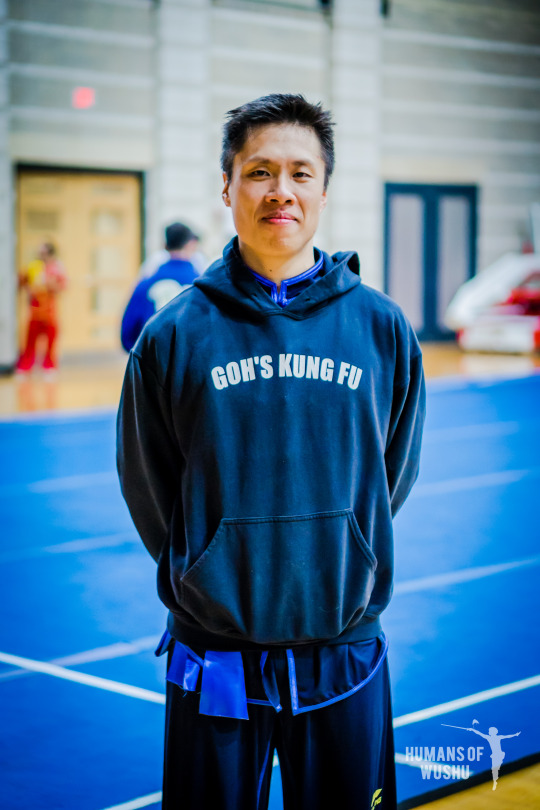
What motivates you to practice these days?
I still hope to improve. Whenever I watch a video of myself I am never satisfied with my performance or ability. But most of all, it's still fun to do. Though I know I am not the best, it gives me a moment in my day when I feel powerful and in control.
How have you seen the wushu community change over the years?
The wushu community seems to be getting a lot younger! I am impressed with what American athletes are capable of doing these days. While, realistically, I may not be able to achieve much more, I am excited to see what the next generations will be able to do.
10 notes
·
View notes
Photo

Ricardo Saldanha is a Wushu Sanda Athlete from Brazil. Saldanha is currently the two times Brazilian Champion as well as the South American champion and Pan-American champion in Sanda.
Sanda is a contemporary fighting sport which include takedowns, throws and striking using arms and legs. Elbow strikes, chokes and joint locks are not allowed in tournaments. The style is influenced by traditional Chinese Boxing and is normally held alongside with taolu or form competitions.
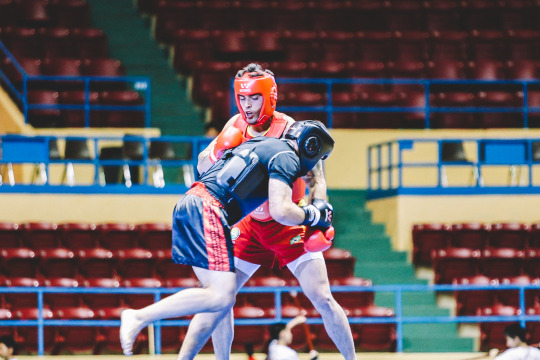
When did you start sanda? Why did you practice sanda in comparison to other martial arts?
I started training in sanda 8 years ago. I wanted to join sanda to lose weight and get into shape. At first I was looking for muay thai because many schools in Brazil have muay thai than kung-fu sanda. The academy I joined did not have it as an option. They had sanda which was rare. I chose sanda because the sport combines punches, kicks and takedowns.
What is the hardest part of training for your fights or matches?
The hardest part is the diet to make the weight. Diet is hard and tough because I like to eat burgers, pizza and Nutella.
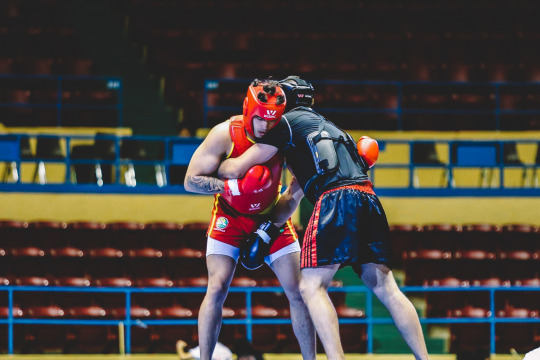
Do you have a ritual to prepare for your fights?
Yes, my focus and my mind are totally concentrated on the fight. I use my mind to see every possible detail of the fight.
Who are your teachers who taught you sanda and MMA?
In sanda, my first teacher was Elton Candido. When I started competing in the Nationals at a higher level of competition, I started training with Daniel Dionisio. In MMA, my coaches are Renato Ferreira, Daniel Evangelista and Odair Samurai who are respectively with Luta-Livre, Wrestling, MMA and Boxing.
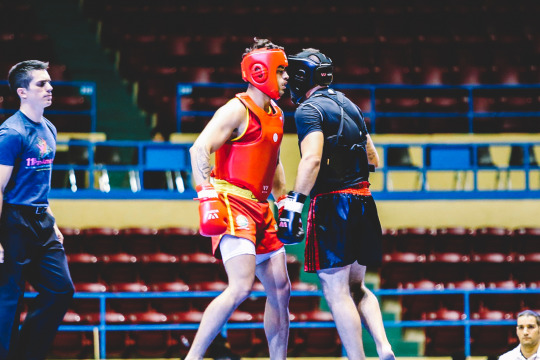
What is your goal for sanda? For MMA?
My goals in sanda are to train and improve every day and keep myself at the top level in the world. While being realistic and patient in my journey, I want to be the best fighter in my weight class in MMA.
Do you have any advice for other fighters?
My tip is to “Become like water, my friend.” This sentence of Bruce Lee is in this context that your mind is malleable. Basically it is hard training with humility and having an open mind. You can always learn and go ahead with the difficulties that exist, the hard training, diet and many sacrifices. In the end, happiness makes it worthwhile.

Contributors
Translators: Henry Sato, Gustavo Dos Santos
Color Processing: Tim Wang
Photographer: Justine Agaloos
2 notes
·
View notes
Text
Haitao Zhao
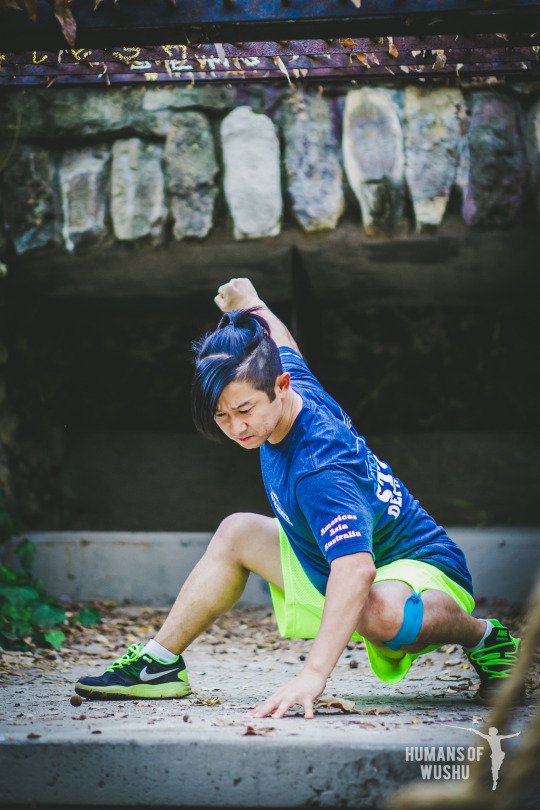
(Original answers in Chinese, translated into English.)
How and when did you start doing wushu?
我大概从五岁半开始练习武术, 那个时候李连杰和成龙的功夫电影开始流行,就很喜欢,所以就开始学习武术
I started practicing wushu around the age of five and a half. At the time, Jet Li and Jackie Chan's kung fu movies were popular and I really liked them, so I started learning wushu.
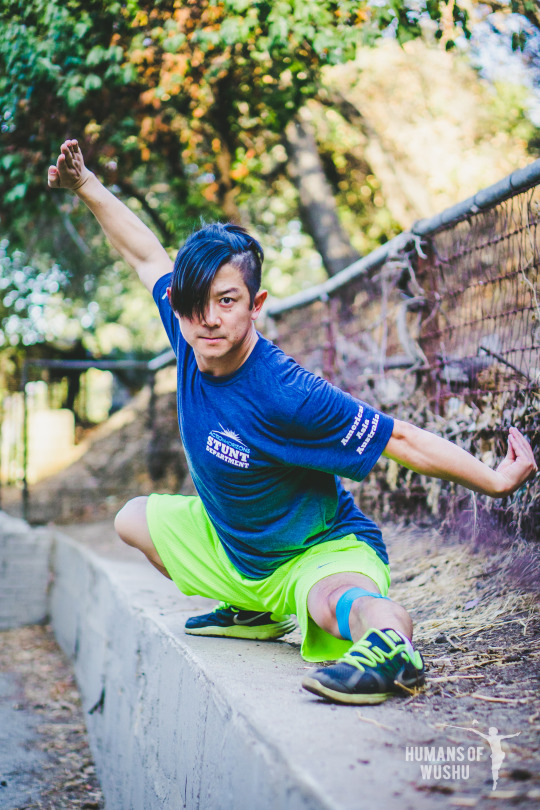
How did you start doing film, stunts, and acting? What do you like most about doing film, stunts, and acting?
从小开始练习武术就是因为喜欢动作片,希望有一天能成为像李连杰和成龙那样的动作明星,所以从小这就是我的梦想!我喜欢做替身,做和动作电影有关的事情,是因为在镜头面前可以更酷的展现自己,可以创造出很多很酷的东西!
I began practicing wushu because I liked action movies. I hope to one day become an action star like Jet Li and Jackie Chan -- it’s been my childhood dream! I do enjoy being a stunt double, really anything to do with action movies, because in front of the camera I can show the best, awesome version of myself -- and create a lot of cool things!
What's the hardest part of your film and stunt work?
作为替身或者从事电影方面的事情,最难的事情,我想应该是你一定要坚持自己的信念,不能轻易放弃!
I think the hardest part of being a stunt double or doing film in general is sticking to your beliefs and not giving up!
How does wushu work with stunts? How has wushu helped you with film?
武术对于一个替身来说真的非常的重要,因为武术本身就是一项需要全身协调能力很强的运动,各个身体体能方面的条件都要求很高,比如说:身体的柔韧性,力量,协调性,弹跳,爆发力,还有表演意识。 这些条件也是作为一个好的动作演员和替身所需要的!
When it comes to stunt work, I really think wushu is extremely important because wushu itself, as a sport, requires the coordination of your entire body. All the physical aspects of wushu are very demanding, such as: flexibility, power, coordination, jumps, explosiveness, and stage presence. These same skills are also necessary to be a good action film actor and stunt performer.
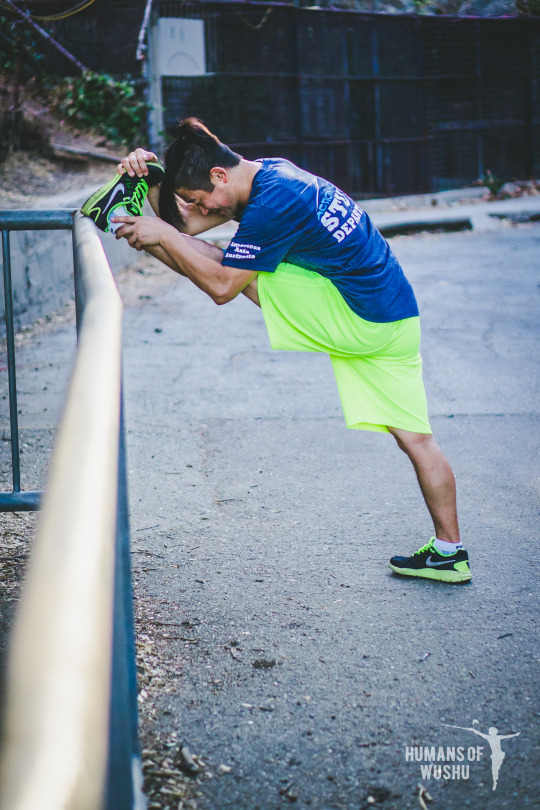
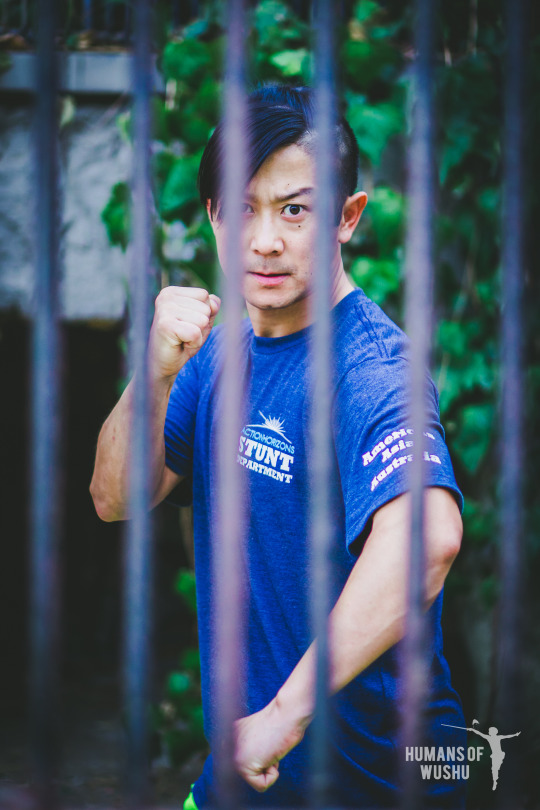
Tell me about a favorite wushu memory.
关于对武术最好的记忆,其实有很多! 永远忘记不了小的时候��练吃的那些苦,压腿有多疼! 但是印象最深的还是第一次在比赛中拿到奖牌,还记得去比赛上火车之前,我的爸爸对我说:你要是这次拿不到金牌就不要回来了! 哈哈哈哈哈!
As for a best wushu memory, I have so many! I’ll never forget those bitter times training when I was young, like how much stretching hurt! But the memory that leaves the strongest impression is the first time I got a medal at a competition. I remember before I got on the train to go compete, my dad said to: If you don’t get a gold medal, don’t come back!
What is your proudest achievement? Why is it special to you?
其实我个人感觉我没有特别值得我自己骄傲的成就,因为我还没有得到很好的成就! 我还要一直加油和努力!
Honestly, I don’t feel particularly proud of any of my achievements. I must keep working hard!
What are you most excited about these days?
因为我最近刚从中国回来,让我比较兴奋的就是,在中国拍电影的时候,看到了很多东西,也学到了很多东西
Since I recently just returned from China, what excites me most these days are all the things I saw and learned during the filming of this Chinese movie.
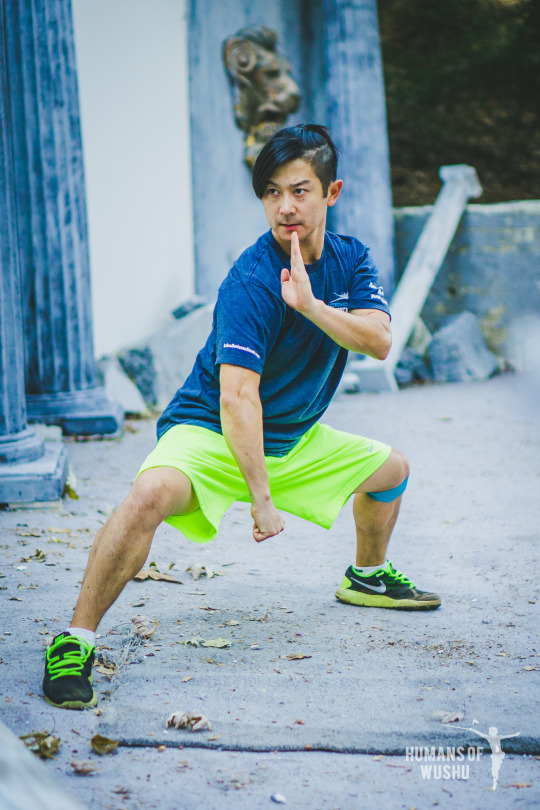
Haitao Zhao
Los Angeles, CA
See Haitao Zhao’s latest stunt reel.
#humansofwushu#haitao#haitaozhao#wushu#chinese martial arts#martial arts#stories#taolu#stuntman#stuntperformer#stunts#action#actionfilm#asiansinfilm#photography#kungfu#fightchoreography#fightscenes#demoreel#cinematography#actionstar#hollywood#universalstudios
19 notes
·
View notes
Text
Rebecca Chinn

“I was a gymnast for 12 years, but going elite and/or doing college gymnastics were never really in the cards for me. After high school gymnastics, I explored a variety other activities but never found anything that embodied the same expressive, powerful energy as gymnastics. I missed it. That is, until I saw someone with a wooden stick do an aerial at a performance showcase. Shortly after, I showed up to Columbia Wushu’s first practice, was warmly welcomed, and taught some basics. I was hooked; I practiced stances in my dorm that night. Once again, I had a discipline in which I could (and really, really wanted to) become a stronger and better athlete, person, and team member. Going from gymnastics to wushu is kind of like studying a language in a new dialect or playing an instrument in a new key. In a lot of ways, it’s a continuation of what I know and love, and in a lot of ways it’s the beginnings of something new and wonderful.”
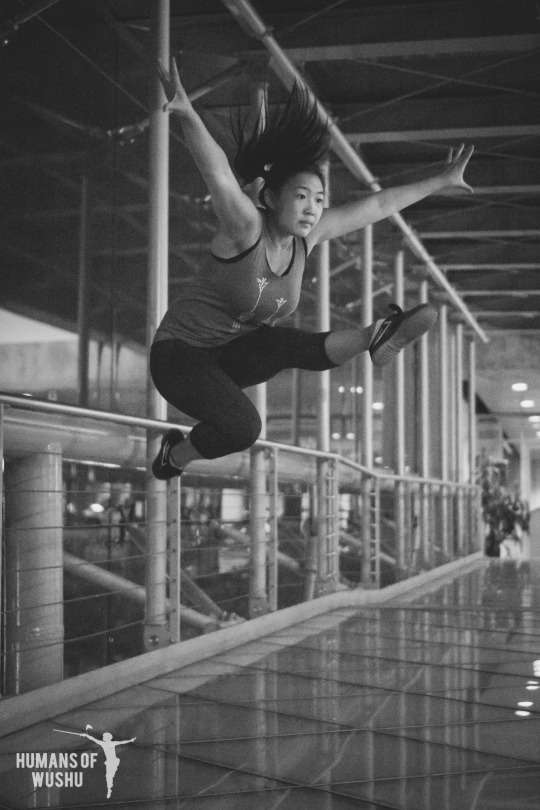
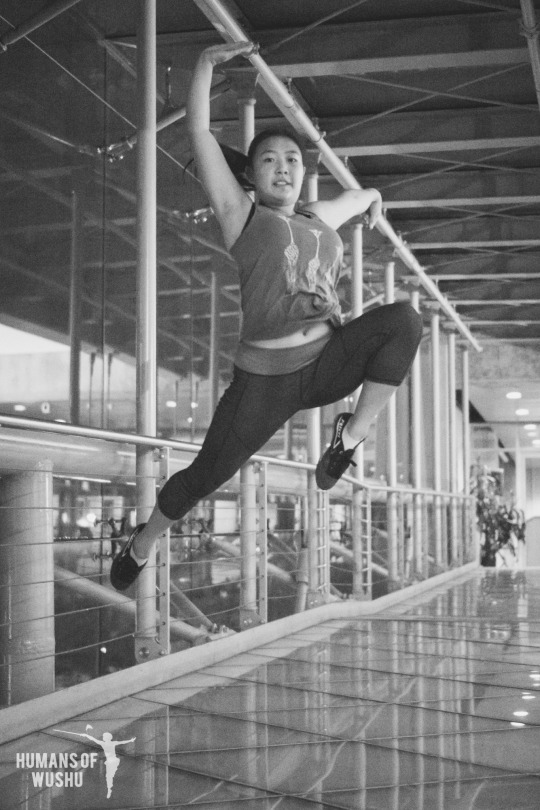
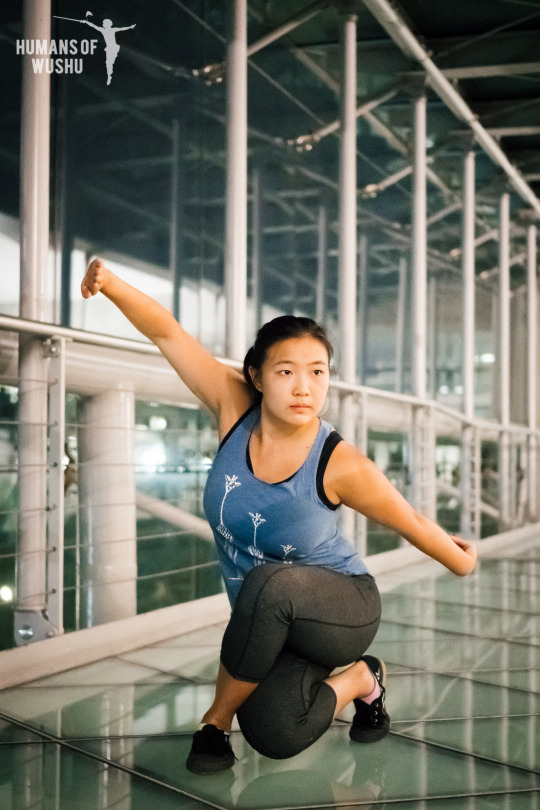
#humansofwushu#wushu#kungfu#chinese martial arts#martial arts#taijiquan#staff#changquan#gymnastics#kicks#fitness#shaolin#crosstraining#taekwondo#capoeira#jiujitsu#taichi
6 notes
·
View notes
Text
Alan Zhao
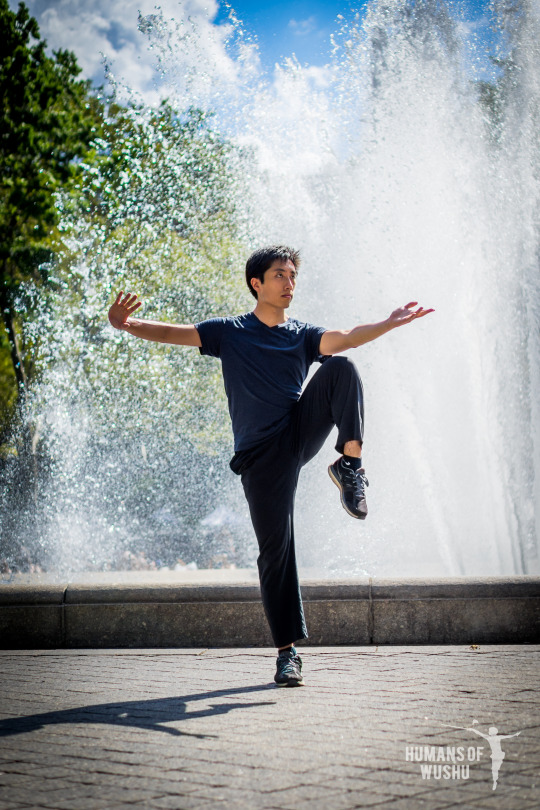
How did you get into wushu?
I started Wushu when I was five as an after class extracurricular to Chinese Language School. We all did the same elementary five-movement form every Sunday for over an hour. New students would join and old ones would forget those five basic movements in between weeks before the next class. So unfortunately, we all regressed together and had to take learning from the top. Again. In hindsight, there were probably more enjoyable activities to be doing at that age but for some reason I didn’t mind the boredom. Part of me believed that if I trained hard enough, and concentrated, I’d be able to see just a little bit of light in my palm. I had moved four times as a child, and with each move I was stubborn to find a new Wushu instructor to continue my practice. For a while there weren’t any established programs in the area that I lived in and I would practice on my driveway or in my coach’s basement. It wasn’t until I took a chance and moved to Virginia to join the O-Mei Wushu team that it all began to make sense… I still remember the first day I walked into the facility. People were training hard, ripping across the competition floor, and respected for their agility, dexterity, and grace. A fire was lit.

How did you transition into Taiji? What prompted that change? What are your thoughts on doing Taiji amongst your peers doing Wushu?
Injury. Something I had been prone to in any sport I played, even ones with zero contact. My coach recommended I use the time healing a hamstring injury to be open to Taiji. She sold it to me saying that it would ultimately help my Wushu, much as learning a foreign language might deepen the understanding of a foreign culture. It wasn’t love at first sight, especially compared to acrobatic, tempestuous Wushu. I was also separated from my teammates after initial warm-ups to focus on wall sit-like stances. But because Taiji is commonly perceived as an elderly practice, at 15 I suppose I looked pretty wise to my teammates when I practiced it, as if I had graduated from Wushu early. Given time and guidance I began to enjoy its constant wave of motion. Understated and grand, Taiji does have its own sedate majesty.

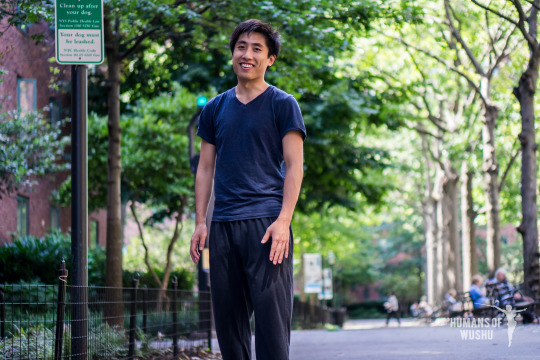
#humansofwushu#alanzhao#wushu#chinese martial arts#martial arts#stories#taolu#taiji#taichi#taijiquan#photography#kungfu
5 notes
·
View notes
Text
Alex Huynh
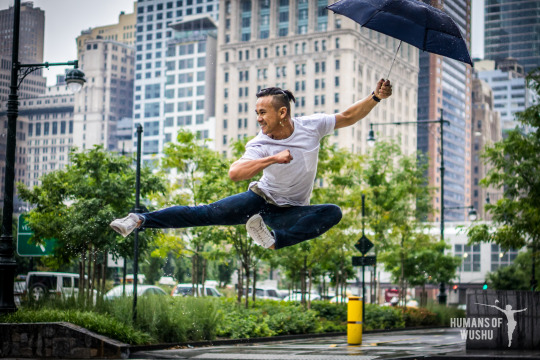
How did you get into wushu?
My martial arts story officially began around the time I was nine. Up to that age, I was a sickly child who used to flail my arms and legs mimicking the family of martial artists I grew up in and the Jackie Chan movies I watched religiously. Starting in ShaoLin Kungfu, I earned a black sash close to when I turned fifteen, right about the same time I began competing around the country in NASKA (the national sport karate circuit). There I met my coach, Zhang Gui Feng, from USWA. She and Chris Pei enticed me with the prospect of representing the country on the US team, so I nestled under their wings as they guided me forward in Wushu.
How did you get your start in film?
When I was five years old, my sister and I put on a puppet show for all the neighborhood kids on our grandparents' front porch. Afterwards, we handed out cookies to the applauding audience. I knew right then and there what I wanted to do for the rest of my life: bring people together, entertain audiences, and give back.
Fast forward to the start of my senior year in university where I was pretending to study for midterms but really reading magazines. That's when I crossed an ad for Cirque du Soleil castings in New York. I thought, "Oh that'd be fun. Another step toward making movies." My best friend Paul shot a highlight reel for me and we sent it off. Lo and behold, Cirque liked it, scheduled an audition, and then offered me a spot in their candidate pool. I had to turn the offer down though because I needed to finish out my college career, but that gave me the confidence to believe people might actually want to watch me do this thing I love. I chose film because what better way to share your gifts across the globe to audiences the world over than through the big screen. I packed my bags and headed to Los Angeles, where after a lot of sweat and hard work, Hollywood legends James Lew and Simon Rhee mentored me into the career I'm so very blessed to be living.
How do you think your stunt work and wushu play together?
Both Wushu and stunt work require a great level of creativity, discipline, meticulousness, and soul. Structurally in Wushu, you learn that a form is made up of four sections, so you choreograph and learn the movements one section at a time. Once you’ve gotten the shape of the whole routine, you go in and dissect the details, finesse each moment, find those areas where you can squeeze a little love and flavor into your form. This parallels quite similarly with fight choreography in stunt work. Instead of a form however, you’re telling a story through the action sequence, which is part of a greater story.

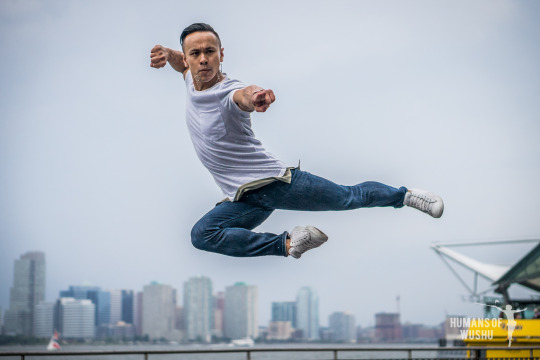
Wushu is often criticized as being too flashy, too showy -- what is your take on that? Has your work with fight choreography changed your perception on this topic at all?
It is! Think about it like this: in Wushu forms competitions, for a minute and twenty seconds, it’s all about you putting on the best performance. The spotlight is on you, so you want to shine…your kicks are higher, your stances are lower, your punches are longer and stronger, and those dramatic pauses are your Beyonce moments. However, in a real fight, you’re less likely to hammer fist anyone or pierce them with a mean head snap.
Humans have two arms and two legs, and how we use these instruments in fight choreography - be it flashy or brutal - depends on the film. Grittier movies wouldn’t have their heroes wax poetic around their opponent with wheel arms. On the other hand, Crouching Tiger-styled films wouldn’t adopt the more direct attacks of Krav Maga. Each martial arts has its aesthetic and practical pros and cons. Which ones are chosen to be showcased in a movie’s fight choreography truly is dependent on the tone of the script.
What would you say to other wushu athletes interested in getting into film?
Learn everything you can, don’t just pigeon-hole yourself in Wushu. Study acting, editing, cinematography, visual effects…everything you can! Dare to be greater. Go beyond your comfort zone to be the best you you can be.
The pain and sweat that Wushu immersed me in also glimmered a hope of greatness. This taught me a valuable lesson in life: any goal worth achieving indeed deserves a good fight. Growth lives on the other side of discomfort. This applies to more than just film work. Just stay focused on driving forward in whatever endeavor. It’ll take work, there’ll be obstacles, but that pressure means you’re headed in the right direction. Just stay humble, stay hungry, keep working to be the best you can. As my coach once told me, “If you're good, no one can say you’re not.”
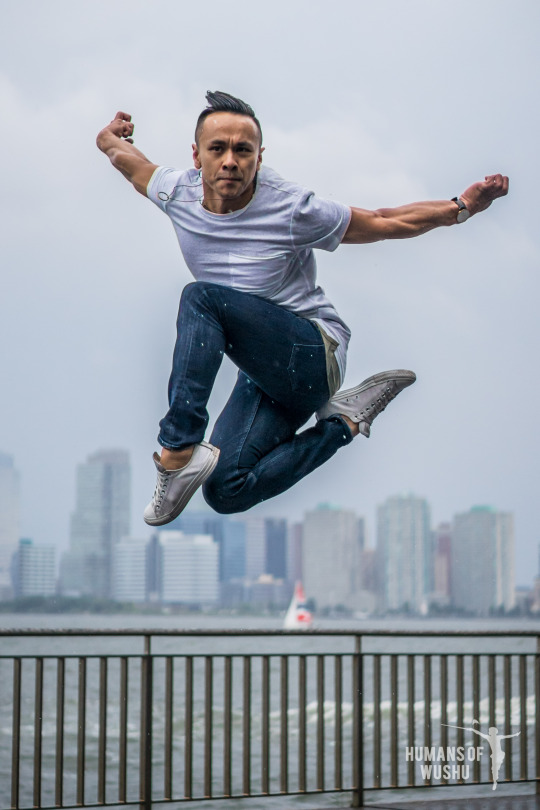
What is your favorite wushu-related story?
I’ve got so many! Most of them relate to Wushu in that so many of my lifelong friends are people I’ve trained and/or competed alongside. Here’s some examples (cover your head, there’ll be a lot of names dropping):
I dressed up as a burrito for Brandon Sugiyama’s birthday.
My Wushu big sister Li Jing and I had a heart to heart about relationships. I cried more than a man should in front of a Beijing Team member.
Wearing my coaches’ daughter’s silks at my very first Wushu competition.
I once got handcuffed by police outside my Wushu school. The guy said I was carrying a machete. Shortly thereafter, I was released because a little girl from my school was parading through the parking lot with her straight sword.
Ming Qiu and Li Jing sang my ears off in a long van ride to set.
Dim Sum with SCWA after Berkeley CMAT.
Y Chan, Brian Hutchinson, and I all clumped together as we were dragged by a Puerto Rican snorkel tour boat.
I accidentally locked the windows in Dennis Ta’s car when he had food poisoning. It wasn’t pretty.
Kevin Morris, Brandon Sugiyama, and way too many Cosmopolitans
Any time I’m with Matt Berberi, Bryan Cartago, and Alvin Hsing. Most recently, I slapped a pizza. #Voltron #LionBrothers
National Geographic’s Fight Science. Yeah I was young and dumb, but I’m still proud of it.
What are you most excited about these days?
My life is an adventure, and honestly I’m excited to wake up every day knowing that the work I do, this gift with which I’ve been given a medium to share to audiences all over the world, could potentially inspire that five year old kid out there to dream bigger than they could ever imagine.
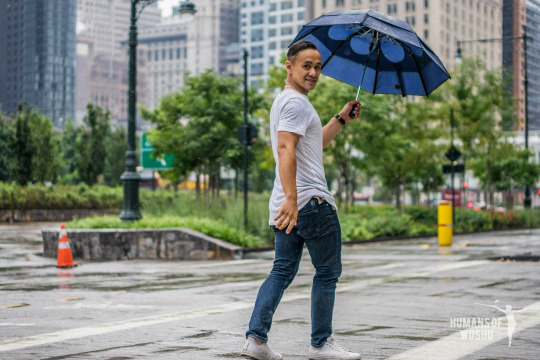
Visit Alex’s Website: http://www.kungfualex.com/
#humansofwushu#alexhuynh#wushu#chinese martial arts#martial arts#stories#taolu#stuntman#stuntlife#asiansinfilm#photography#kungfu#fightchoreography#cinematography#fightscenes
17 notes
·
View notes
Text
Tenyia Lee
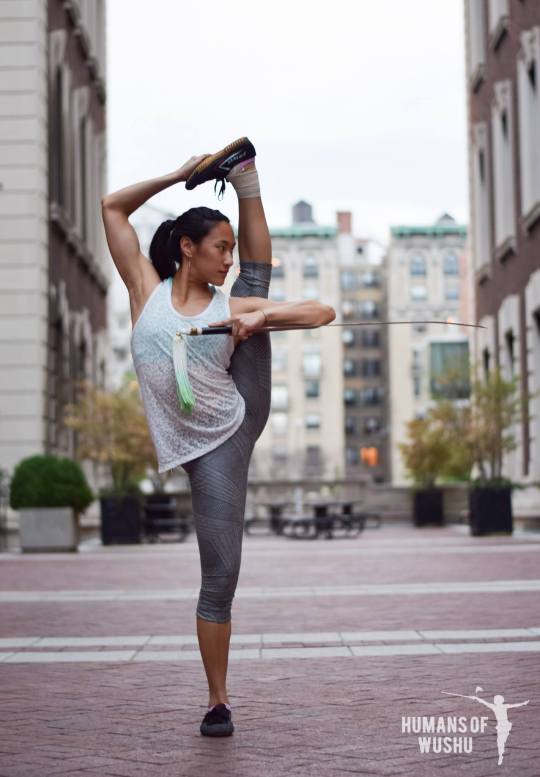
Why did you come back to Wushu after stopping for five years?
I stopped Wushu because I burned out of it…at some point I hit a wall mentally so I stopped training when I got to college. I was doing Wushu on and off for those five years, but I realized in that time that Wushu was not something that I could run away from. It was just too much a part of my life, in a good way. Wushu has been a lot of different things to me: it was something I loved for a very long time, something I had all of these goals for, and even something I hated at one point. But the thing about Wushu is that it can be so many things at various stages of our lives. So I came back to it with the acceptance that it would be something different, and that’s what I wanted it to be.
#wushu#humansofwushu#martial arts#kungfu#taiji#sanda#stories#Taolu#nanquan#jianshu#daoshu#qiangshu#changquan#nandao#gunshu#shaolin#photography#lives
9 notes
·
View notes
Text
Xiaoyi Chen 陈笑仪

Where and when did you start doing Wushu?
I enrolled in a Wushu primary school at the age of 8 in Shandong province. There, I received elementary education as well as Wushu training till high school. High school, I enrolled into a sports school where in addition to training Wushu, I took classes in language, history, politics, math and science. Only after finishing high school and getting certified as a class 2 athlete by the General Administration of Sports did I qualify for application to Beijing Sport University. At BSU I majored in Traditional Chinese Sports with a focus in Wushu. I enrolled in the required Wushu courses my first two years at the university. After graduation, I passed the 6th duan Wushu test and came to the US to pursue further studies.
你是什么时候开始训练武术的?
我8岁开始在中国山东武术学校上小学,在武术学校每天训练和学习文化课,一直到高中。高中的时候,我开始转到体育学校学习武术。在高中,除了练习武术,我还有文化课学习。有英语、数学、语文、政治、科学等文化课程。高中毕业后,我考到了国家二级运动员证书,报考了北京体育大学。考入北京体育大学,我的专业是武术,也叫做民族传统体育。大一和大二学期武术课是必修的,每天训练。四年后我毕业了,通过了武术段位,得到武术6段证书。后来到了美国继续读硕士,暂停练习武术。
How did you get introduced to Wushu in the US and what are your goals?
I didn’t really keep up with my Wushu when I arrived in the US. But one day, I spotted a guy carrying a Wushu bag on the Boston subway platform! It turns out he trains and coaches in the area and he invited me to both Wellesley and Harvard Wushu practices. I have coached and trained with the teams ever since! The Chinese martial arts community in Boston is actually quite abundant (a lot of traditional Wushu), and I want to continue my best effort to help spread the art, culture and sport of Wushu!
你是怎么开始接触美国武术的?你对武术有什么目标吗?
一天在波士顿橙色地铁站,看到一个人背着武术器械的袋子。 我们一起聊天知道,他是卫斯理做武术教练,后来他邀请我去参加了哈佛大学武术队和卫斯理武术队的训练。现在,我也是卫斯理武术教练。中国武术在波士顿其实很丰富,我要继续努力弘扬武术,弘扬中国文化!
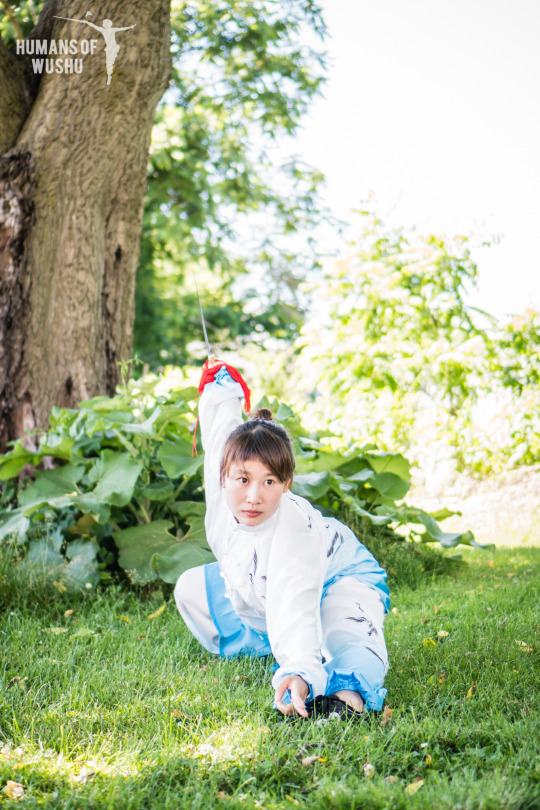

#wushu#humansofwushu#martial arts#kungfu#taiji#sanda#stories#taolu#nanquan#jianshu#daoshu#qiangshu#changquan#nandao#gunshu#photography#lives#shaolin
7 notes
·
View notes
Text
Kevin T. Wong

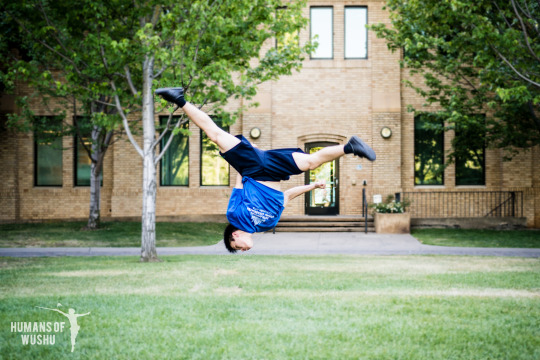
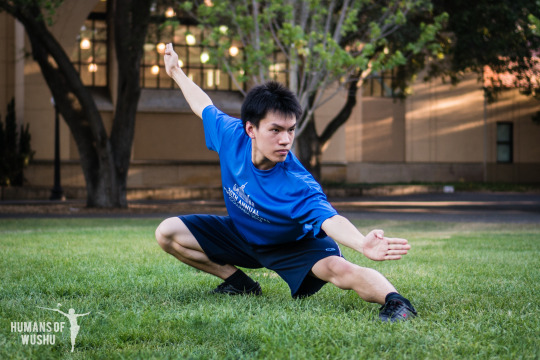
What got you started with wushu?
I started wushu pretty randomly in high school. We had a martial arts club that was led by a friend of mine, and he convinced me to try it out. I liked it, stuck with it, and ended up joining his wushu school. From there it just kind of slowly took over my life. At some point I started training about ten hours a week. And, well, I still am.
What is your favorite weapon?
To be honest, my favorite weapon is probably whatever I've been learning most recently. First it was broadsword, then double broadswords, and then chain whip. Right now it's my damojian, which is kind of like double daggers except the daggers have handles that are also sheaths and they sheathe into each other and it's SUPER AWESOME.
How has your life evolved/changed with wushu?
My life is wushu. I work my schedule around training times. I apply to jobs that are near wushu centers. I talk to people I know from wushu – usually about wushu. I guess I would say that I was kind of undefined before. I didn’t know what I wanted to do or who I wanted to be. Now I do. I want to keep practicing wushu, learn everything there is to learn, and become the best that I can be. I am Kevin T. Wong. The T stands for wushu.
#wushu#humansofwushu#martial arts#kungfu#taiji#stories#sanda#taolu#nanquan#jianshu#daoshu#qiangshu#changquan#nandao#gunshu#shaolin#photography#lives
36 notes
·
View notes
Text
Binh Nguyen
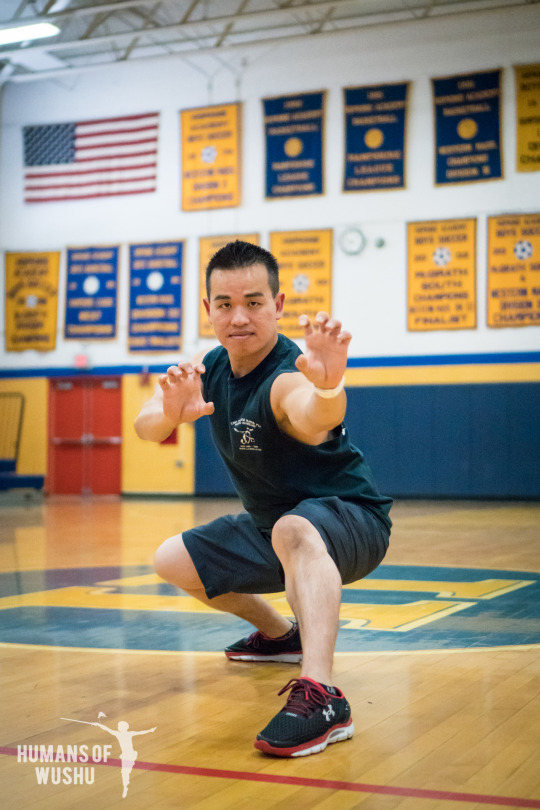
How long have you being doing wushu?
Officially around 8 to 9 years. I have been doing traditional martial arts before that because Wushu wasn’t very famous… so 20 years all together. I did traditional first, and then Wushu.
We are here at the 4th Annual Kungfu Wushu Tournament in Hadley, MA today, what inspire you to start this competition?
Honesty, I just like to see more competition in this area especially, since there are not a lot of competitions. I have called around every school possible to see if they are offering any kind of tournament in-house. Nobody said yes or answered my calls. Eventually I got really, kind of frustrated, because I grew up here, I trained here, you know, I used to do a lot of tournaments like karate… we need like Kungfu and Wushu tournaments here. So I said, “Let’s do it, and see how it goes… and here we are! 4th time!”
#wushu#humansofwushu#marital arts#kungfu#taiji#stories#sanda#taolu#nanquan#daoshu#jianshu#qiangshu#changquan#nandao#gunshu#shaolin#photography#lives
3 notes
·
View notes
Text
Brandon Sugiyama
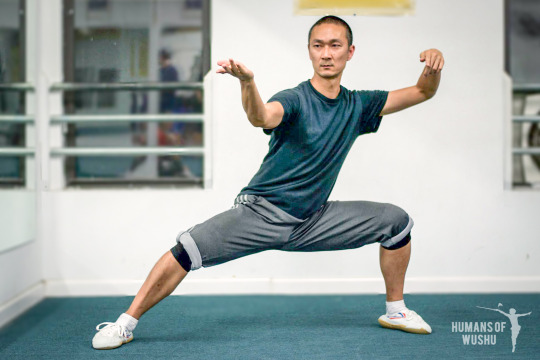
How did you get into wushu?
I got into wushu really randomly. I met a guy named Dan, and we became friends and he has done wushu before where he was from, the Bay Area. But we were going to school in Oregon where there’s basically not much Chinese martial arts there… and he wanted to continue practicing, so he decided to start a Wushu club and he was trying to promote it, and because we were friends, he invited me to go try the class. Initially, I was not interested at all because I didn’t know what Wushu was… and Dan had described it as Contemporary Martial Arts, but that didn’t really mean anything to me. And then a couple weeks into the class, my friends have gone and they came back and encouraged me to go. So I decided to go check it out. I remembered the class being really hard, being really awkward, you couldn’t do any of the moves. I was very inflexible. But for some reason, because it was so difficult, I really liked it. There was something about that, that appealed to me, and I think immediately after the first practice, I was pretty hooked and I just kept coming back to practice for like... forever.
What do you think makes Wushu unique?
It’s interesting to practice a sport that the general public doesn't know much about, so it almost feels like we're learning something secret. I remember being in Oregon and because the club was brand new, like literally no one knew what we were doing. And it did really feel like a special thing to be part of this group that was just forming and learning this art that was not popular at all. Any time someone send us a video tape, it was like Gold, it was something really really special to gain access to a book, a magazine, a video. But even now that wushu is getting more popular, the community is still very close knit and I like that. The athletes are really into sharing information and hanging out. You can travel across the globe and if you meet someone who does wushu, there's an instant bond...I've made so many friends that I've met maybe only once at a tournament, but if I went to a city where they were living, they offered me their sofa, to take me around... there was really this sense of community and openness that has kept me in the sport for a long time.
What is one most memorable story?
When I was in Wushu in college, I was the biggest Wushu geek you can ever imagine. I was way more into it probably than anybody I knew… I was actually friends with Wushu people who has been doing it since they were kids, and they would make fun of me because I was the biggest Wushu dork. Any video that I can get my hands on, i would just love talking about it; reading books, and traveling around and meeting as many people. So, the summer between my Junior and Senior year of college, I went to China for 3 weeks, it was the first time I went to China to train. When I came back, I wanted to keep training so I subletted a room in Berkeley so i could train one, with the UC Berkeley club, Cal Wushu, and two, with my coaches’ coaches at Pacific Wushu. So it was during that summer that I made friends with people in the Bay Area and that’s when we started talking about the idea of wouldn’t it be awesome that we could have a Wushu tournament just for college students. It was such a basic idea. After the first year, it have never missed a year since. It makes the tournament a really unique thing, it’s always been a grass root community effort.
#wushu#humansofwushu#martial arts#kungfu#taiji#stories#sanda#taolu#nanquan#daoshu#jianshu#qiangshu#changquan#nandao#gunshu#shaolin#photography
46 notes
·
View notes